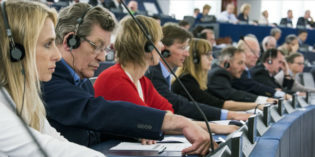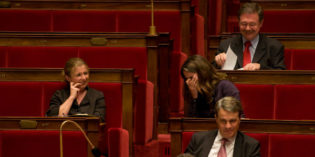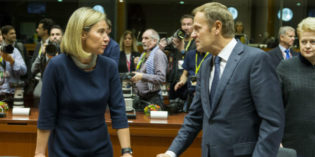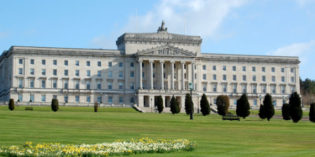Tag: European Parliament

European elections 2019: what will happen in the West Midlands?
In 2014 the West Midlands region split its votes and seats three ways, with UKIP first and winning three seats, and Labour and the Conservatives somewhat behind and gaining two seats each. In 2019 all the polling indications are that this Eurosceptic region is getting strongly behind the new Brexit Party; it can be sure of winning three of the region’s seven seats, and might even win four. If they are held to three, then the other four seats are likely to be shared out evenly between Labour, the Conservatives, the Lib Dems and the Greens. The vote share gaps separating these parties are small, however, and there is enough polling volatility for the precise outcome still to change. With voters able to cast only a single vote for a party list, the Democratic Audit team reviews likely outcomes for the parties and the main potentially electable candidates.

European Parliament elections 2019: what will happen in Wales?
When electing MEPs to serve in the European Parliament, Wales has been at least a five-party system for a decade. In both the last two contests the top four parties (Labour, UKIP, the Conservatives and Plaid Cymru) each gained one of the four MEPs, and the Liberal Democrats and Greens lost out. This time around the Brexit Party has replaced UKIP and is doing so well that it should gain two seats to Labour’s and Plaid Cymru’s one each. With voters able to cast only a single vote for a party list, the Democratic Audit team reviews likely outcomes and the candidates that could be elected here.

European elections 2019: what will happen in England’s South West?
In recent years the South West of England has become a Conservative stronghold, as the opposition from the Liberal Democrats in rural areas dwindled, restoring an older pattern of Labour challenging from the few big cities like Bristol, Plymouth and Exeter. However, in European Parliament elections, UKIP came first in 2014, winning two of the region’s six seats, and helping shape a strong Leave vote in the 2016 Brexit referendum – an inheritance that now falls to the Brexit Party. With regional Conservative support now at unprecedentedly low levels, the three strong pro-Remain parties are vying to get two seats between them. With voters able to cast only a single vote for a party list, the Democratic Audit team reviews likely outcomes and the main potentially electable candidates.

European elections 2019: what will happen in London?
With eight seats to play for, London is the jewel in the crown of the European Parliament elections, and the area certain to get most media attention. Long a bastion of Remainers (voting 60:40 to stay in Europe in 2016) the capital has also been increasingly strong for Labour in recent years. However, Corbyn’s ambiguity over his EU stance seems to have recently begun to erode the party’s standing, especially for the European Parliament elections. Two recent polls give the Liberal Democrats two seats, and one has them beating Labour into first place. Brexit Party poll ratings are relatively weak in the capital, but they are still on track to win two seats. The Greens and Tories seem sure of winning a seat each. And Change UK still has some chance here. With voters able to cast only a single vote for a party list in this PR election, the Democratic Audit team reviews the likely outcomes for the parties, and looks at who the potentially electable candidates are.

Should the rest of the EU follow Austria in reducing the voting age to 16?
For the last decade, Austria has been the only country in the EU that allows voting at the age of 16 at all political levels. Paul Schmidt assesses whether this could offer a future model for the EU, and the possible lessons that can be learned from the Austrian experience.

The absent demos: radical ideas for transforming the way MEPs are elected
Brexit has pushed European law-makers to seriously talk about rebuilding the EU. Miriam Sorace argues that calls for democratising the EU political system have to be addressed immediately, and that priority should be given to reforms of the European elections. She advocates a uniform Open-List Proportional Representation System with small constituencies and the possibility for national parties to […]

Good news: fielding women candidates doesn’t put parties at a disadvantage in elections
We know women are more likely to be elected under proportional representation, but it hasn’t been clear which aspects of PR benefit them. Sona N. Golder, Laura B. Stephenson, Karine van der Straeten, André Blais, Damien Bol, Philipp Harfst and Jean-François Laslier designed an experiment in which people could cast (fake) votes for (real) European […]

Seizing political opportunity: how the European Commission becomes a ‘policy entrepreneur’
Political actors need to be nimble and respond to the opportunity to reform old policies and initiate new ones. Manuele Citi and Mogens K Justesen look at how the European Commission takes advantage of politically opportune moments (the ‘gridlock interval’) in the European Parliament to put forward new legislation. As a ‘policy entrepreneur’, it is therefore […]




 Democratic Audit's core funding is provided by the Joseph Rowntree Charitable Trust. Additional funding is provided by the London School of Economics.
Democratic Audit's core funding is provided by the Joseph Rowntree Charitable Trust. Additional funding is provided by the London School of Economics.